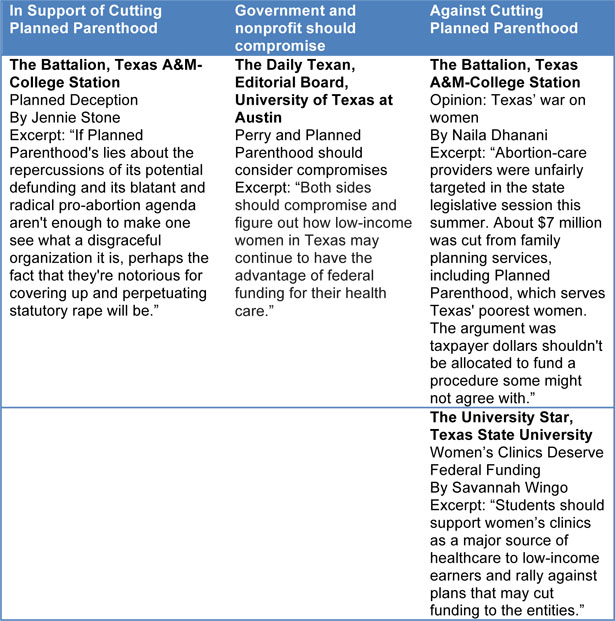
The Mesquite Editorial Board discussed the recent controversy in Texas concerning a health program for low-income women and the state’s promise to exclude abortion-affiliated Planned Parenthood as a provider for the program, which has sparked a nationwide reaction. Using direct outreach and social media, we sought opposing viewpoints from students, and received two — from students with pro-life and pro-choice stances — who ultimately both disagree with the state’s barring Planned Parenthood from Texas’ Women’s Health Program. We also included links to news articles and opposing viewpoints written by students from other universities and colleges (see below). We invite you to voice your view by submitting a viewpoint online or emailing opinion editor Angelica Hartgers at angelica.hartgers@jaguar.tamu.edu.
Read related story by The Texas Tribune

Q&A: English junior Saul Ramirez
In 2011, state lawmakers directed the Health and Human Services Commission to establish the Affiliate Ban Rule, which prohibits organizations that have the same name as abortion providers from participating in the Women’s Health Program. Do you agree with the Texas Legislature’s decision in 2011 to reinstate a law that prohibits state funds from going to organizations linked to abortion providers? Why or why not?
I most definitely do not agree with the reinstatement of the law. Rick Perry and his affiliates have pushed to cut off federal funds for Texas’ Women’s Health Program and fund the program entirely from state subsidizing. If the power is relinquished, which it has been, Perry is able to push his pro-life agenda against health care providers who affiliate directly or indirectly with abortions.
What kind of effect can taking away federal funds from the Texas’ Women’s Health Program have on the state?
The biggest effect would be the state having complete power to dictate which healthcare providers are able to provide services to low-income women who are enrolled in the program. Having the state dictate which programs they see fit for the public undermines the public’s need to choose a provider according to their own ideology. For instance, under the new state-funded Texas Women’s Health Program, doctors are only allowed to discuss abortion as long as it does not lead to a “course of action to women in the program.” Also, with abortion being the driving force behind the exclusion of providers like Planned Parenthood, Texas citizens need to question whether they are willing to have certain rights, like the right to choose, to be taken away by state government, and if even the state should even hold that kind of power.
Do you agree with Governor Rick Perry’s accusation that keeping Planned Parenthood as a provider in the Women’s Health Program is furthering a pro-abortion agenda? Why or why not?
It is important to notice and distinguish what pro-abortion and what pro-choice is. Pro-abortionis the idea that an abortion is entitled to any woman who wants one regardless of race, age or contraception situation. Pro-choice is the neutral mentality that abortion is neither seen as criminalized or as morally right, but instead suggests that the choice to choose what a woman wants to do should be made available and should not be dictated by law. Rick Perry is the prime example of a politician who cannot keep church and state separated. Perry insists that Planned Parenthood is pro-abortion to keep his “moral” ideology intact, reinforcing the system of power that oppresses a society rather than uplifting and using his position to truly make a difference.
Ultimately, what positive or negative effects would come out of taking away Planned Parenthood as a provider in the Women’s Health Program for low-income women across the state?
Since Texas has attempted to deny Planned Parenthood state funds, the non-profit has filed suit against the state in hopes of keeping its clinics included in the program. However, Perry and his affiliates have drafted new rules/clauses for a new, state-funded program that will exclude abortion-affiliated providers. If Planned Parenthood comes out victorious in court in December, Texas will do completely out with Texas’ Women’s Health Program and replace it with the new program. This action can cause many low-income women to be denied access to the Planned Parenthood clinics that they conveniently and frequently receive health care at, all because of the Republican ideology on abortion. Is instilling individual beliefs on a collective society more important than thousands of women having access to the most health care resources more important? Perry and everyone behind the new reformation of the WHP refuse to see the bigger picture that there are women who depend on programs like Planned Parenthood and any other clinic as such to survive. I have to question whether the men and women behind Perry and his affiliates truly know the extent of their authority and the importance of their responsibility to the people of Texas. Their ideology emphasizes the infrastructure of class and race state-wide which leads to the question: How can low-income families truly depend on the privileged and wealthy, whose worries on healthcare are minuscule compared to their own, to know the urgency and dependency they have to such programs?
[divide]

Q&A: Counseling and guidance graduate student Sonya De La Garza-Walker
De La Garza-Walker considers herself to be pro-life, but she also does not agree with the affiliate ban rule. A photo will be uploaded Friday.
In 2011, state lawmakers directed the Health and Human Services Commission to establish the Affiliate Ban Rule, which prohibits organizations that have the same name as abortion providers from participating in the Women’s Health Program. Do you agree with the Texas Legislature’s decision in 2011 to reinstate a law that prohibits state funds from going to organizations linked to abortion providers? Why or why not?
I do not agree with the Texas legislature’s decision in 2011 to reinstate the law that prohibited state funds from going to organizations linked to abortion providers. One of such providers is the notorious Planned Parenthood. One shocking statistic is the amount of federal government funds which actually contributes to the program. According to Associated Press reporter Will Wissert, 90 percent of the program, which costs around $40 million annually, is funded by the government.
What kind of effect can taking away federal funds from Texas’ Women’s Health Program have on the state?
Programs such as Planned Parenthood prevent the “back alley abortions” which can be deadly to women, and often lead to severe health problems due to performing abortions incorrectly. Abuse and neglect of children in the state of Texas could and likely would rise if the women were unfit to raise the children themselves. As such, I do not agree with the Texas decision.
Do you agree with Governor Rick Perry’s accusation that keeping Planned Parenthood as a provider in the Women’s Health Program is furthering a pro-abortion agenda? Why or why not?
I do not agree with Governor Rick Perry’s accusation that keeping Planned Parenthood as a provider in the Women’s Health Program is furthering a pro-abortion agenda. Planned Parenthood is not only a clinic that provides abortions, it is also a leading clinic that provides cancer screenings and other services to about half of the around 130,000 low-income Texas women enrolled in the Women’s Health Program. The Women’s Health Program is designed for those who might not otherwise qualify for Medicaid. This indication is a crucial fact that the clinic should not be viewed as simply an abortion clinic, but a women’s health clinic as well.
Ultimately, what positive or negative effects would come out of taking away Planned Parenthood as a provider in the Women’s Health Program for low-income women across the state?
I believe that there are going to be negative effects in that many clinics will be forced to close due to lack of funding, the result being that thousands of women may be forced to find other low-cost clinics from which to get resources. Unfortunately, those too could likely be affected, and ergo, many women would be without care.
Read what other students in Texas have written on the issue:
Texas Law Could Cut Funding To Women’s Clinics
By Megan Carthel
University Star, Texas State University
Excerpt: “Texas officials recently attempted to pass a law to exclude any non-profit clinics providing abortion services from receiving funding from the Medicaid Women’s Health Program. Seven Planned Parenthood facilities then sued the state, arguing the ruling violates the organization’s right to free speech.”
Public hearing to be held for changes to Texas Women’s Health Program
By Michelle Marie Garcia
The Daily Texan, UT Austin
Excerpt: “The Women’s Health Program received a hit in March when Gov. Rick Perry announced Texas would now exclude Planned Parenthood, a family planning agency that provides health care to about 130,000 low-income women, from the program because it provided abortions. Since then, Planned Parenthood has sued the state to remain in the program.”
Planned Parenthood representatives rue loss of women’s health care in abortion fight
By Alma Linda Manzanares
The Ranger, San Antonio College
Excerpt: “Women in Texas are losing health care options because of family planning cuts, a ultrasound bill and abortion politics.
Representatives of Planned Parenthood, a family planning network discussed threats in “Moving Forward: Standing Strong for Women’s Health Care,” March 8 in the Women’s History Symposium.”
Viewpoints/Editorials
Read the full viewpoints/editorials:
Perry and Planned Parenthood should consider compromises
Women’s Clinics Deserve Federal Funding
Your turn. Reply below by posting a comment.







